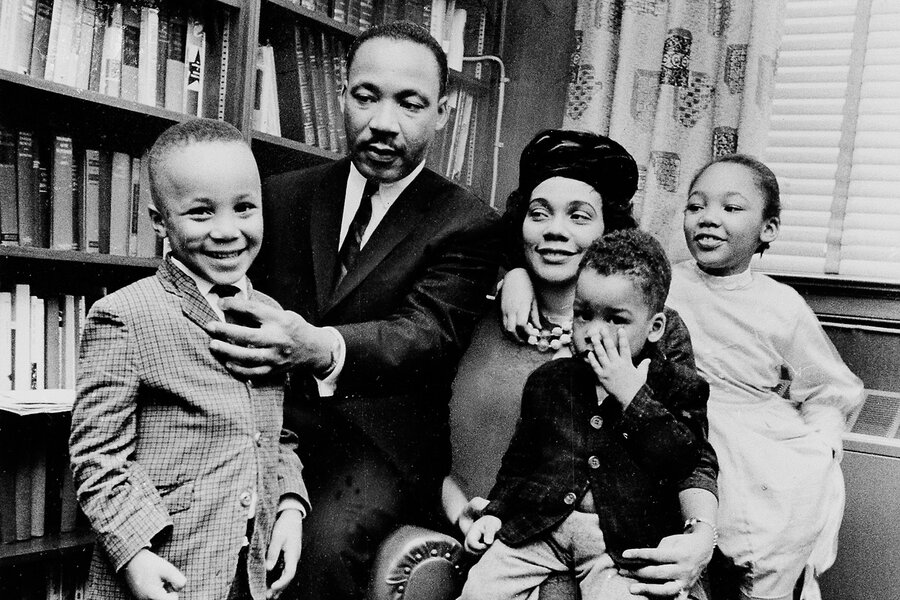On Martin Luther King Jr. Day, a reflection on sons, fathers, and daughters
Loading...
| Atlanta
My younger son, all of 3 years old, recently surprised me with his understanding of the Civil Rights Movement: “I know who Martin Luther King is!”
I smiled when he told me about how Dr. King “got off the bus,” which was his interpretation of the Montgomery Bus Boycott. As with many watercolors, his interpretation of one of the 20th century’s most recognizable moments was messy, but beautiful.
Snuggling with him and his older brother on the couch, I asked them, “Do you want to see Dr. King?” They nodded. I showed them an excerpt of one of Dr. King’s affirmations of Blackness.
Why We Wrote This
A story focused onA moment with his boys reminds our columnist of how Dr. King was passed down to him. “I can remember a particularly cold Atlanta morning as a preteen, when some of my friends from church and I hopped on a bus from Augusta and took the two-hour drive,” Ken Makin writes.
“Somebody told a lie one day. They couched it in language. They made everything Black ugly and evil. ... Well, I want to get the language right tonight,” Dr. King said. “I want to get the language so right that everyone here will cry out, ‘Yes, I’m Black. I’m proud of it. I’m Black and beautiful!”
The brown eyes of my older son lit up. My younger son, who has a lighter complexion than his brother and dad, had something to add to his palette of colors – that we are all different shades of Black.
The moment reminded me of how Dr. King was passed down to me – through recitations and parades. I can remember a particularly cold Atlanta morning as a preteen, when some of my friends from church and I hopped on a bus from Augusta and took the two-hour drive. I don’t remember the parade as much as I do the experience, being there in the presence of so many people in such an iconic location.
Folks forgetting about the real Dr. King is how I ended up with the Monitor. It’s easy for me to identify with Dr. King’s movement in Memphis, Tennessee, because I was moonlighting in the manufacturing business in 2020 when George Floyd was murdered. That led to my first column with the Monitor. My angst was with people who would otherwise be political and ideological opponents of Dr. King, using his words and actions for their own gain. The irony of that, of course, is that he spoke with such clarity that misquoting him requires a great deal of omission regarding his actual work and words.
This is not only a mistake made by those who might have opposed Dr. King. Our hero is often distilled down to his labor, as his holiday is the only one in the United States that is a national day of service. This, sadly, still fails to get to the fullness of who he was.
Dr. King was, on top of everything else, a man who knew how to have a good time. I love seeing the photos of him playing pool. I love to see the pictures of him playing with his children. It’s a reminder that for as much as we might give to the world, our first ministries begin at home.
On Sunday night, before I attended the Beloved Community Commemorative Service at Ebenezer Baptist Church in Atlanta, I stood in line for two hours at a pop-up store in nearby Chamblee. My kids love Sonic the Hedgehog, and so do I. How much more fulfilling are our memories when we supplement joy with understanding, when we balance finite disappointment with infinite hope?
When I approached Ebenezer Monday morning for the service sponsored by The King Center, the area was not as I remembered from those earlier trips. This had less to do with the actual growth of the area and more with my development as a human being. Martin Luther King is a name that means something. It is a generational surname that recalled a revolutionary name to create a movement that defined this country. It is a story of fathers and sons, the passing down of ideas, and how the next generation might interpret them.
It is also a story of daughters, often forgotten in this movement. But the Rev. Bernice King’s voice, much as her father and her father’s father did in this hallowed sanctuary, would not be denied, even as the celebration of Dr. King was juxtaposed against the impending presidential inauguration.
“For some, today’s moderation represents the best of times – ‘Make America Great Again.’ For others, it highlights the worst of times, set America back again,” Ms. King said. “For some, today’s King holiday represents freedom, justice, and democracy. For others, it’s a day to deprive DEI and disavow a legacy of peace, love, and justice, and to distort the meaning of King’s words.”
By the time she finished her moderation, Ms. King had elicited the type of emotion and applause that her father did close to 60 years ago. It was a reminder of how civil rights is a movement of lineage – and that family tree is as beautiful as it is tragic. But that lineage is available to each of us, if we are willing to work for it. Herein lies the fullness of what is required for this country to be full, to be great.
The Rev. William Barber II was born in 1963, two days after Dr. King’s March on Washington. He, too, is a son of the movement. His parents moved him from his native Indianapolis to North Carolina to participate in the desegregation of the public school system in Washington County.
Like Ms. King, Mr. Barber was able to bring Dr. King to the present by reminding us that the challenges of yesterday and today are remarkably similar.
“The last night he was with us, he was grieving,” Mr. Barber said to the packed church in Atlanta Monday. “When he gave his last sermon in Memphis, he didn’t preach to one America. He was grieving ... because [America] was a schizophrenic nation moving toward two societies, one white, one Black, one separate, one unequal.
“While he was grieving, he decided to preach that last time, not a lecture, but a sermon deep down in his soul. And in the midst of that, he was honest with us and gave us the cure. He said the nation is sick, yet also, in the midst of sickness, God is at work.”







